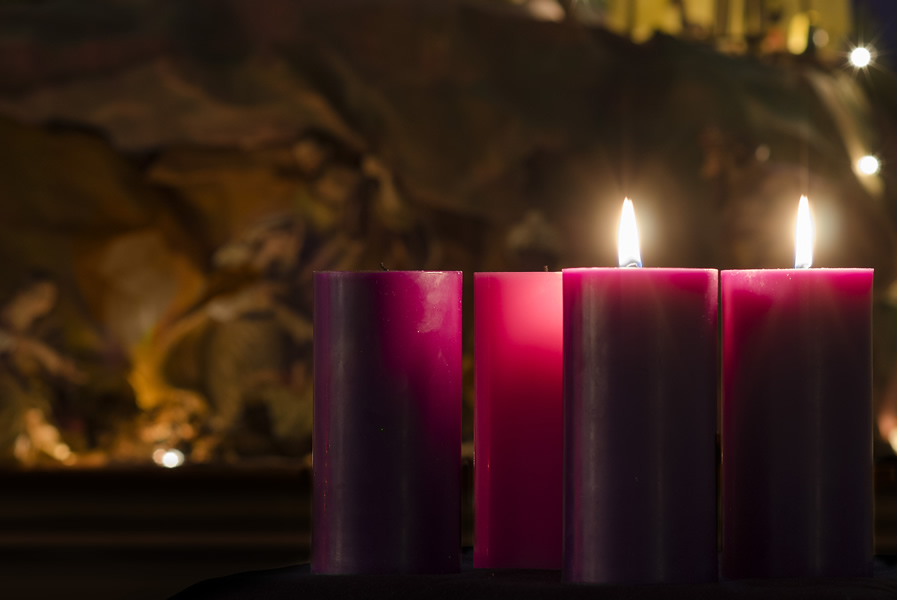
Advent: A New Chance for Preparation, Hope, and Anticipation
by Fr. Tony Okolo C.S.Sp., V.F. | 12/08/2024 | Weekly ReflectionBeloved Parishioners,
It is with delight that I welcome you to the Church’s new year as we begin the New Church’s liturgical year. We are now in Year C for the Sunday readings, and on that note, I say Happy New Year to you, all my beloved parishioners.
We praise the God of our salvation for the new thing he has done for us (Isaiah 43:19) by letting us be alive to revolve into a new year introduced by the season of Advent. The season of Advent, which spans the four weeks leading up to Christmas, is a profoundly meaningful time in the Church’s liturgical calendar. It not only marks the beginning of the Church's year, but also is a season of preparation, prayer, and reflection. If we want to take it personally, Advent can be for us, a time to reflect on Christ's presence in our lives and to spiritually prepare our hearts for His coming.
The word “Advent” comes from the Latin word adventus, meaning “coming” or “arrival.” The season originally began in the 4th century when early Christians would use this period to prepare for the Lord’s return in glory at the end of time. Over time, however, Advent became more closely associated with the preparation for Christmas and the celebration of Christ’s first coming.
As I said earlier and, in my homily, last week, I explained that Advent lasts for four weeks, with each Sunday focusing on a particular theme that reflects an aspect of the Christian faith. The four themes of Advent are traditionally Hope, Peace, Joy, and Love. The first week of Advent focuses on hope—we are reminded that our ultimate hope lies in Christ, who brings salvation and renewal to the world. The second Sunday shifts the focus to peace—peace in our hearts, in our relationships, and in the world. Advent peace is not just the absence of conflict but the presence of Christ's peace, a peace that transcends understanding and heals divisions. The third Sunday of Advent is traditionally known as “Gaudete Sunday,” a day of rejoicing. The word “Gaudete” comes from the Latin word for “rejoice,” and it is a day to celebrate the nearness of Christ’s arrival. The tone of the liturgy changes slightly on this Sunday, and the color of the vestments worn by the priests may shift from purple to rose to emphasize joy and anticipation. The fourth and final Sunday of Advent focuses on love—the love of God for humanity, revealed in the gift of His Son.
The Church’s traditional symbol of this season is the Advent wreath, a circular wreath made of evergreen branches, which symbolize eternity and the unchanging nature of God. The wreath typically holds four candles, three purple or blue, and one rose-colored—which are lit progressively each Sunday of Advent. Some Advent wreaths also include a fifth candle, a white one, which is lit on Christmas Eve or Christmas Day to symbolize the arrival of Christ. The four candles of the Advent wreath correspond to the themes of the season: Hope, Peace, Joy, and Love. As each candle is lit, we move closer to the fulfillment of our Advent hope, the promise of God. The lighting of the candles is a powerful visual reminder that, despite the darkness of winter or the challenges of life, the light of Christ is coming into the world.
Advent is also a time of waiting, but it is not a passive waiting; it is an active, expectant waiting. There are several ways Catholics are encouraged to make the most of this season. First, through Prayer and Reflection. Advent is a time to deepen one’s relationship with God through prayer, meditation, and reflection on the Scriptures. We are called to ask ourselves, “How am I preparing my heart to receive Christ?” Second, through penance and repentance. While Advent is not a penitential season like Lent, it still carries an invitation to repentance and renewal. We are invited to reflect on areas of our lives that may need healing or transformation. The sacrament of reconciliation (confession) is particularly meaningful during this time, offering us a chance for spiritual renewal before celebrating the birth of Christ. I wish to remind you about our penance service on December 16th at 5:30pm. Third, through acts of charity. Advent is also a time to focus on the works of mercy. As we await the coming of the Lord, we are called to serve others, particularly the poor, the sick, and the marginalized. Acts of charity during Advent help to align our hearts with the heart of Christ, who came to serve and not to be served.
However, in the midst of modern commercialism and the rush of holiday shopping, the true meaning of Advent can often be overshadowed. Retail stores may start their Christmas promotions as early as October, and the frantic pace of preparing for the holidays can make it difficult to focus on the spiritual significance of the season. Advent calls us to slow down, to stop and reflect, and to prepare our hearts for the coming of Christ, rather than getting caught up in the material aspects of the season. Advent reminds us that we are not merely preparing for a holiday, but for the coming of our Savior. It is a time to set aside distractions and cultivate a spirit of prayer, reflection, and anticipation. We have scheduled an Advent retreat on December 18th and 19th after morning Masses to help have a deeper time with the Lord during this season. By keeping Advent as a time of focused spiritual preparation, we can more fully enter into the joy and peace of Christmas when it arrives.
May this Advent season be a time of deepening faith. Let us await Christ with hopeful hearts, eager to welcome the light that dispels all darkness.
BACK TO LIST